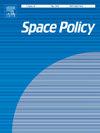美国在月球的战略利益:对经济、国家安全和地缘政治驱动因素的评估
IF 1.9
4区 社会学
Q2 INTERNATIONAL RELATIONS
引用次数: 0
摘要
自20世纪80年代以来,美国领导人多次指示美国重返月球,但每次都在宣布后的几年内被取消。然而,随着“阿尔忒弥斯计划”,30年来首次出现了连续两届总统政府批准的重返月球计划。如今,人们对月球的兴趣已经超越了与美国国家航空航天局探索计划相关的传统科学和鼓舞人心的动机,军事、商业和国际实体都在阐明相应的、有时是独立的月球目标。一些政府领导人认为,重返月球已经成为美国的战略利益。本文调查了这一说法,研究了美国月球野心背后的经济、国家安全和地缘政治驱动因素。我们发现,虽然关于月球探索和开发对经济和国家安全的重要性的言论经常被夸大,但这些部门内部也有一些合理的理由。月球探索和开发也有强大的地缘政治驱动因素。本文章由计算机程序翻译,如有差异,请以英文原文为准。
U.S. Strategic Interest in the Moon: An Assessment of Economic, National Security, and Geopolitical Drivers
Since the 1980s, U.S. leaders have repeatedly directed the United States to return to the Moon, yet in each case, efforts were canceled within a few years of being announced. However, with the Artemis Program, for the first time in 30 years, a plan to return to the Moon has been endorsed by two successive presidential administrations. Today, interest in the Moon extends beyond the traditional scientific and inspirational motivations associated with the National Aeronautics and Space Administration’s exploration plans, with military, commercial, and international entities articulating corresponding, and sometimes independent, lunar goals. Some government leaders have argued that the return to the Moon has become a strategic interest for the United States. This paper investigates this claim, examining the economic, national security, and geopolitical drivers underlying U.S. lunar ambitions. We find that while rhetoric on the economic and national security importance of cislunar exploration and development is often overstated, there are some legitimate reasons for interest within these sectors. There are also strong geopolitical drivers for cislunar exploration and development.
求助全文
通过发布文献求助,成功后即可免费获取论文全文。
去求助
来源期刊

Space Policy
Multiple-
CiteScore
3.40
自引率
36.40%
发文量
40
期刊介绍:
Space Policy is an international, interdisciplinary journal which draws on the fields of international relations, economics, history, aerospace studies, security studies, development studies, political science and ethics to provide discussion and analysis of space activities in their political, economic, industrial, legal, cultural and social contexts. Alongside full-length papers, which are subject to a double-blind peer review system, the journal publishes opinion pieces, case studies and short reports and, in so doing, it aims to provide a forum for the exchange of ideas and opinions and a means by which authors can alert policy makers and international organizations to their views. Space Policy is also a journal of record, reproducing, in whole or part, official documents such as treaties, space agency plans or government reports relevant to the space community. Views expressed in the journal are not necessarily those of the editors or members of the editorial board.
 求助内容:
求助内容: 应助结果提醒方式:
应助结果提醒方式:


